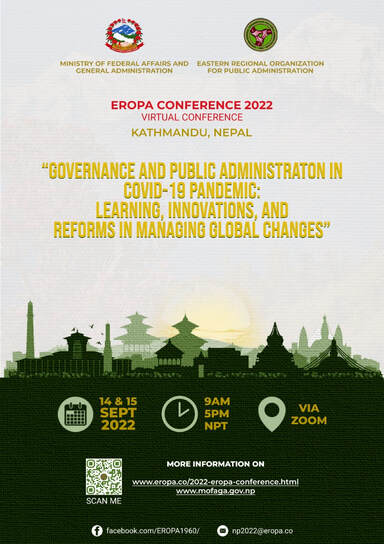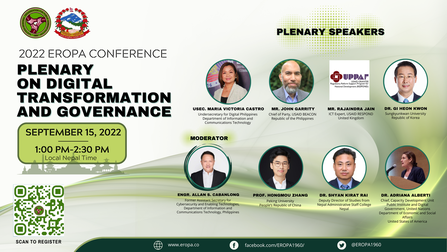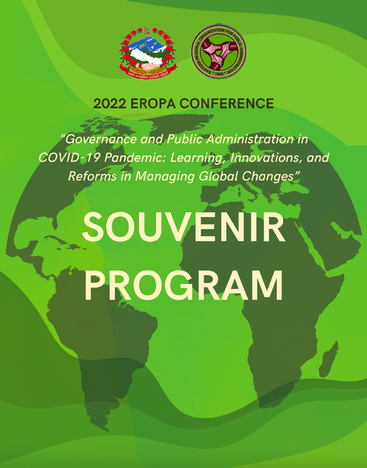- Home
- About
-
Publications
- Public Administration News
-
ARPA
>
- ARPA Scope and Objectives
- ARPA Editorial Board
- ARPA Call for Papers
- Submit Article
-
ARPA Open Access
>
- India (2020-2023, Vol. 31, Nos. 1&2, pg. 4-22)
- Nepal (2020-2023, Vol. 31, Nos. 1&2, pg. 23-46)
- Vietnam (2020-2023, Vol. 31, Nos. 1&2, pg. 47-67)
- China (2020-2023, Vol. 31, Nos. 1&2, pg. 68-79)
- South Korea (2020-2023, Vol. 31, Nos. 1&2, pg. 80-99)
- Bangladesh (2020-2023, Vol. 31, Nos. 1&2, pg. 100-119)
- USA (2020-2023, Vol. 31, Nos. 1&2, pg. 120-141)
- Abstracts >
- Publication Ethics and Malpractice Statement
- Notes for Contributors
- Journal Indexing
- EROPA Bulletin >
- Resources >
- Membership
-
Conferences
-
Activities
- #TAG Dialogue
- Contact Us

Our daily hobbies and habits of going out, meeting people, enjoying the public goods, traveling on board to visit the different touristic hubs around the globe, trekking and marching have been overtaken by lockdown, staying at home, avoiding social and physical contacts, isolating from families and friends and following health protocols for last almost two years. The cause for this enormity of the situation is none other than Covid-19, from which the world is agitating a lack of reliable treatment and cure. Coronavirus is reining the world rapaciously and challenging the system of governance worldwide through its shifting capacity and variants.
By nature, the Coronavirus seems egalitarian. It left no one basing economic class, political ideology, and origin. It spread worldwide and marred the health system, governance system, and administration capacity. Covid-19 has compelled us to realize our reality of the poor status of health facilities where people are dying without essential public health infrastructure and services. Failure to respond promptly to those who are in dire need of help and provide crucial services has challenged the social contract theory., The whole governance system in most countries has faced challenges whether they are developed or not.
After all, Covid-19 has proven that the world has yet to learn. We are not prepared enough for the worse condition, haven’t developed any panacea for all our problems, and are yet to face them. So many sectors, including systemic, structural, operational, and behavioral, need to be reformed and reshaped. We should be able to introduce innovations and internalize them in our governance and administration to maintain and develop resilient capacity. Now, this hardship has provided an opportunity for our policymakers and leaders to rethink and revise working modalities and patterns that have to rely on facts and evidence rather than ideology and populism.
The Asia-Pacific, which holds the largest population and rising economy, has been badly affected by this virus. The scar of this pandemic might remain in all aspects of human life, including the economy, society, governance, and so forth, for a long. Considering this fact, we have chosen the theme that reflects the Covid-19 experiences, learning, sectors to be reformed, and innovations for change management.
By nature, the Coronavirus seems egalitarian. It left no one basing economic class, political ideology, and origin. It spread worldwide and marred the health system, governance system, and administration capacity. Covid-19 has compelled us to realize our reality of the poor status of health facilities where people are dying without essential public health infrastructure and services. Failure to respond promptly to those who are in dire need of help and provide crucial services has challenged the social contract theory., The whole governance system in most countries has faced challenges whether they are developed or not.
After all, Covid-19 has proven that the world has yet to learn. We are not prepared enough for the worse condition, haven’t developed any panacea for all our problems, and are yet to face them. So many sectors, including systemic, structural, operational, and behavioral, need to be reformed and reshaped. We should be able to introduce innovations and internalize them in our governance and administration to maintain and develop resilient capacity. Now, this hardship has provided an opportunity for our policymakers and leaders to rethink and revise working modalities and patterns that have to rely on facts and evidence rather than ideology and populism.
The Asia-Pacific, which holds the largest population and rising economy, has been badly affected by this virus. The scar of this pandemic might remain in all aspects of human life, including the economy, society, governance, and so forth, for a long. Considering this fact, we have chosen the theme that reflects the Covid-19 experiences, learning, sectors to be reformed, and innovations for change management.
Sub-Themes
Revisiting the Role of Local Governments
Being a doorstep government, Local Governments (LGs) have proven that LGs are the first responder to the citizen and can prevent the spread of the virus more effectively. For instance, in some countries, their actions were more effective than that of regional and Central Governments. These pieces of evidence indicate that there has to be a movement for further decentralization based on the principle of subsidiarity. Only the Local Government dealt with and solved the issues of continued service delivery and protection of the people’s livelihood in any disaster and crisis. Local Governments are the nearest government to the people. They have the more remarkable ability to influence behavioral changes among their citizen. The health sector mandate given to the Local Governments can’t be managed to the extent the finance transferred to them.
This sub-theme will focus on the following areas:
Being a doorstep government, Local Governments (LGs) have proven that LGs are the first responder to the citizen and can prevent the spread of the virus more effectively. For instance, in some countries, their actions were more effective than that of regional and Central Governments. These pieces of evidence indicate that there has to be a movement for further decentralization based on the principle of subsidiarity. Only the Local Government dealt with and solved the issues of continued service delivery and protection of the people’s livelihood in any disaster and crisis. Local Governments are the nearest government to the people. They have the more remarkable ability to influence behavioral changes among their citizen. The health sector mandate given to the Local Governments can’t be managed to the extent the finance transferred to them.
This sub-theme will focus on the following areas:
- The principle of subsidiarity
- Decentralization and local governance
- The mandate for local governments
- Capacity building of the personnel working for the local governments
- Information sharing and networking among all the governments of the country
Reforming the Governance and Public Administration
Reforming the public governance and administration means redefining the idea of the traditional understanding that people are receivers and the government is the provider or the classical notion of the top-down bureaucratic system has the solutions for all problems instead making the governance and administration more reliable, more effective and acquiring resilient capacities. In a situation of crisis, every step taken by the the government may have a more significant impact on the overall management of the problem. So righteous the decision, effective communication, accepting social norms, working with communities and taking help and support from society will make both the government authorities and citizens are more responsible and accountable for combating panic conditions.
This sub-theme will focus on the following areas:
This sub-theme will focus on the following areas:
- Coordinated efforts across governments, private sectors, and civil society
- Protecting public goods
- Utilizing social norms
- Sustained public education and awareness-raising campaign
- Global common good
- Experiences and good practices sharing
- Multi-skilled human resource management
- Portfolio approach
Internalizing Innovations in Managing Global Changes
The big and nasty blow Covid-19 has hit in the face of the current world order has preached many lessons. Now the world will not be run the same way; the developed country will harness innovations as much as possible. In this way, the developed countries may change their governance, service delivery mechanisms, preparedness for potential future crises, health systems, and more technologically innovative ways.
Asia-Pacific countries have been developing foundations in various dimensions of society and governance. For example, economic, political, social, cultural, technological, etc. They must learn from other countries worldwide and develop a resilient capacity to effectively respond to any severe crisis that can happen at any time in the future.
This sub-theme will focus on the following areas:
Asia-Pacific countries have been developing foundations in various dimensions of society and governance. For example, economic, political, social, cultural, technological, etc. They must learn from other countries worldwide and develop a resilient capacity to effectively respond to any severe crisis that can happen at any time in the future.
This sub-theme will focus on the following areas:
- Human-centered design and system
- Digitalize and connected
- Behavioral insights in policymaking
- One stop shop
- Selling local products through smartphones
- Smart service delivery
- Bottom-up innovations and collective intelligence
Strengthening Digital Governance for Managing Global Changes
The global crisis caused by the Covid-19 pandemic has again proved and emphasized the relevance of digital governance. Work from home, take away service, virtual classes, training and seminars, mobile banking, use of Artificial Intelligence in medical sectors and service delivery, etc. are some examples of digital governance modes. One of the positive sides is that these kinds of services have been common in developed countries for the last many years, but this pandemic has forced even the least developed countries to adopt and apply those modes of technology. So, this pandemic has created the environment of simultaneously preparing digital-friendly citizens worldwide. Thus, every government in the world has to prioritize investing in digital infrastructure, policy, outreach etc. So that better connectivity will be created to meet the global pace of changes.
This sub-theme will focus on the following areas:
This sub-theme will focus on the following areas:
- Digital literacy
- Digitalize and connected
- Digital technology for change management
- Use of artificial intelligence during a crisis
- Social awareness through social networks
- Digital-based service delivery or using digital tools for service delivery
- Social media management and code of conduct
Plenary Sessions
The Plenary Sessions will be uploaded in the official YouTube channel of EROPA.
Please consider subscribing to the channel to keep yourself updated with the latest videos from the organization.
Please consider subscribing to the channel to keep yourself updated with the latest videos from the organization.
- Home
- About
-
Publications
- Public Administration News
-
ARPA
>
- ARPA Scope and Objectives
- ARPA Editorial Board
- ARPA Call for Papers
- Submit Article
-
ARPA Open Access
>
- India (2020-2023, Vol. 31, Nos. 1&2, pg. 4-22)
- Nepal (2020-2023, Vol. 31, Nos. 1&2, pg. 23-46)
- Vietnam (2020-2023, Vol. 31, Nos. 1&2, pg. 47-67)
- China (2020-2023, Vol. 31, Nos. 1&2, pg. 68-79)
- South Korea (2020-2023, Vol. 31, Nos. 1&2, pg. 80-99)
- Bangladesh (2020-2023, Vol. 31, Nos. 1&2, pg. 100-119)
- USA (2020-2023, Vol. 31, Nos. 1&2, pg. 120-141)
- Abstracts >
- Publication Ethics and Malpractice Statement
- Notes for Contributors
- Journal Indexing
- EROPA Bulletin >
- Resources >
- Membership
-
Conferences
-
Activities
- #TAG Dialogue
- Contact Us




